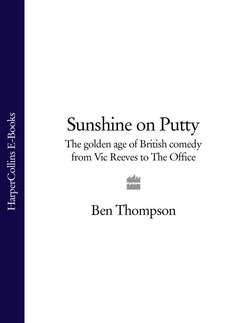Читать книгу Sunshine on Putty: The Golden Age of British Comedy from Vic Reeves to The Office - Ben Thompson, Ben Thompson - Страница 28
Steve Coogan in flashback
Оглавление‘I remember thinking very rationally,’ says Steve Coogan of his fiercely ambitious younger self, ‘I’m eighteen years old now, and all the people in show business who I find entertaining – Rowan Atkinson, John Cleese – they will get older, and there will have to be new people. There are people in sixth forms now who in ten years’ time will be successful and they’re just like me, so why can’t I be one of them?’
No one could accuse this man of lacking focus. As an adolescent, Coogan would drag schoolfriends off the bus to his home in the Manchester suburb of Middleton to force them to enjoy his Monty Python and Not the Nine O’Clock News records. ‘“No, Steve,” they would say, “I don’t want to listen to comedy, I want to go home.’”
Diverting from an apparently pre-ordained course to ‘an all-right sort of white-collar job’, and having been rejected by several fancy London drama schools, Steve Coogan went to Manchester Poly and launched himself into show business. Doing live gigs as an impressionist as a means of getting an Equity card – ‘I just thought, What can I do that other people can’t? and I knew I could do voices’ – Coogan, in his own words, ‘achieved mediocrity very quickly’. He got on TV, did Neil Kinnock and Jeremy Paxman for Spitting Image, sat on Des O’Connor’s sofa and even shook hands with Jimmy Tarbuck on Sunday Night at the London Palladium.53
His voice was – if a momentary slip into the Partridge-esque idiom can be forgiven before Norwich’s most eloquent ambassador has even had a proper name-check – quite literally his fortune. Coogan’s knack for modulating his tone of address to send out just the kind of confident, thrusting message advertisers liked to deliver meant that alongside his straight comedy work there was also a good living to be had from voice-overs, corporate training videos and presentations. While this work brought substantial material rewards, it nevertheless intensified the young Coogan’s apprehension that as quickly as his career was progressing, it was not necessarily moving in the direction he would have wanted.
His fear that he might be becoming, in his own damning phrase, ‘a cut-price Bobby Davro’ was intensified by a harrowing experience at the Edinburgh Festival in 1990. Sharing a flat and a nightly bill with the as yet largely unheralded Frank Skinner, Coogan found himself horribly eclipsed by the latter’s easy way with the crowd.
‘He was very hard-working and very good,’ Coogan remembers. ‘He did twenty minutes at the top of his act unscripted, just chatting to the audience, and I couldn’t do that – I’m someone that has to craft what I do, but Frank can busk it: he’s a natural.’
One year later, Coogan – having opted not to return to the scene of his Edinburgh humiliation – was in a hotel in Rhodes in Greece, ‘doing a sort of holiday rep entertainment for families and getting told off for swearing’. He picked up a newspaper in a hotel box room and read that Skinner had won the festival’s prestigious Perrier Award. ‘It was’, Coogan admits with engaging frankness, ‘probably the most depressing moment of my life.’
At this point, he had already started work on On The Hour and by the time a further twelve months had passed, Coogan would be back in Edinburgh, winning the same award for himself with a new show (performed in conjunction with future Fast Show mainstay John Thomson) featuring more developed comic characters, rather than throwaway impressions. A key influence on this happy reversal of fortune would be Patrick Marber, who not only directed and co-wrote Coogan’s Perrier Award-winning 1992 show, but seems to have played a role in the successful overall redirection of his career not dissimilar to that of Noriyuki ‘Pat’ Morita in the Karate Kid films.
‘For a while it was kind of like a big brother/little brother relationship,’ Coogan remembers. ‘I wouldn’t do anything without asking Patrick what he thought.’
They first met properly in Edinburgh in 1990.
‘Steve was depressed because he was getting annihilated by Frank,’ says Marber, ‘but I did my best to reassure him that he was a funny guy who would have his day.’
On this sympathetic foundation, a friendship was built and Marber soon found himself acting as a ‘kind of mentor…I think at that time I had more confidence in Steve’s talent than he did’.
To say that the high-earning but as yet critically unacclaimed Coogan had a chip on his shoulder at this point might be putting it a little strongly, but there was certainly a salt and vinegar crisp or two up there. And presumably, in terms of On The Hour, his burgeoning alliance with the Oxford-educated Marber must have made for a reassuring buffer zone against an intimidating group of cooler-than-thou, non-mainstream writer-performers from more illustrious educational backgrounds than Manchester Poly? Coogan smiles. ‘I think that’s a fair summation.’
Similarly for Marber, snatched from comedic oblivion and plunged into a very competitive arena wherein people were liable at any moment to bring up the fact that he had ‘once done an act with a panda’, it is easy to see how a friendship with the brazenly successful Coogan made sense. What no one could really have predicted was that the complex personal and professional dynamic which developed between the two men would produce some of the boldest and most enduring comedy of the nineties.
